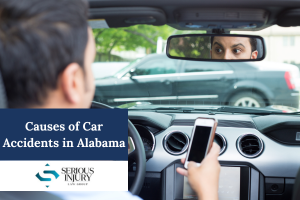Causes of Car Accidents in Alabama

For those who are injured in a car accident in Alabama, it can be a bewildering and difficult time. Lost income, extremely high medical expenses and the constant stress that accompany a serious injury can take a toll. If this sounds familiar, you are not alone.
In 2016, more than 155,000 crashes occurred in our state, according to the most recent car accident statistics from the Alabama Department of Transportation. The total marked a five percent increase from the prior year. Those crashes led to 1,089 deaths and 47,653 injuries. Those numbers also were significantly higher than they were in 2015.
Get Started with your CaseCall Us at 1-855-Serious
Many auto accident victims feel anxiety about proving who was at fault and establishing how their accident happened. Getting help from an experienced lawyer can make a difference. At Serious Injury Law Group, we help injured people and their families throughout Alabama to investigate automobile crashes and seek the compensation they deserve for their injuries and losses. As we have found, the following are some of the most common causes of crashes (in alphabetic order):
Animals
Many single-car crashes, road runoffs and even head-on collisions occur in Alabama because drivers swerve to avoid a deer, dog or other animal that darts into the road.
Construction Zones
Highway construction zones can be dangerous. The sudden lane shifts, signs and lights can be confusing and disorienting to drivers. It is important to always reduce your speed in these areas and be on high alert.
Design Defects
Some vehicles are simply built wrong. Over the years, certain vehicles have been notorious for rollover accidents or crushing injuries due to insufficiently constructed roofs. Likewise, faulty brakes and defective steering mechanisms can also lead to accidents.
Distracted Driving
Being distracted is more than just texting or talking on the phone. It is allowing any distraction to take your attention off the road and driving safely, including interacting with passengers, playing with controls or eating, drinking, smoking or grooming while behind the wheel. “Unseen object/person/vehicle” contributed to 10,698 crashes in Alabama in 2016, according to the DOT.
Drowsy Driving
When drivers are medicated or don’t get enough rest, they can become fatigued and even fall asleep at the wheel. This is a common cause of many semi-truck crashes as well. “Fatigued/asleep” served as a factor in 2,681 auto accidents in 2016 on Alabama roads, the DOT notes.
Drunk Driving
Nearly 6,000 drivers who caused crashes in Alabama in 2016 were cited for alcohol or drug use, the DOT reports. Even the use of certain types of prescription drugs before driving can be dangerous. Make no mistake: Impaired drivers lack the judgment and motor control to drive safely. They put everyone on the road at risk of injury or death.
Inexperience/Teen Drivers
Many teen drivers are safe and responsible on the road. However, as a group, teenagers are less experienced and lack judgment. As a result, they are more likely to engage in risky behavior such as speeding and distracted driving.
Night Driving
When people drive at night, they need to take extra precautions. Forgetting to use lights, failing to acknowledge restrictions or limitations on night driving, and driving beyond one’s comfort level can all contribute to serious accidents.
Poor Road Maintenance
It should come as no surprise that many of Alabama’s roadways are in poor condition, with some in complete disrepair. When local, state and federal government agencies allow roads to develop large potholes, these hazards can contribute to serious crashes.
Reckless Driving
Reckless driving is a catch-all term for operating a vehicle with gross disregard for the safety of others. This can mean driving at excessively high speeds, swerving in and out of traffic and other aggressive driving behaviors.
Running Red Lights and/or Stop Signs
Road rules are in place to keep traffic flowing and keep people safe. When drivers disregard traffic controls like lights and stop signs at intersections, they jeopardize the well-being of others, including bicyclists and pedestrians.
Speeding
As the DOT states, speeding is the No. 1 cause of fatal crashes in Alabama. That includes driving faster than posted speed limits and going too fast for road, weather and traffic conditions. When drivers speed, they can lose control of the car, and they lack the time and distance to avoid collisions.
Tailgating
Following too closely is a leading cause of rear-end collisions. If you tailgate a driver, you won’t have the ability to avoid a crash if the front driver needs to suddenly slow down or stop.
Unsafe Lane Changes
Drivers can cause crashes when they turn or merge with not enough space, and they cut off other drivers. They can also trigger accidents when they do not use their turn signals.
Weather (Ice, Snow, Rain, Fog)
Most of Alabama does not experience a large amount of snow in the winter, but rain, freezing rain, ice, sleet and hail can cause problems. Drivers must reduce speed and use common sense when weather conditions are poor.
Wrong-Way Driving/ Improper Turns
U-turn restrictions are in place to prevent serious crashes at blind intersections and other dangerous areas. Some drivers ignore these precautions and cause serious crashes. Likewise, drivers may become disoriented in new or unfamiliar surroundings, even driving the wrong direction on interstates and highways. In 2016, crashes caused by drivers on the wrong side of the road resulted in 785 crashes and a total of 32 deaths in Alabama.
Get Help from Experienced Alabama Car Accident Lawyers
If you have suffered injuries in an Alabama car accident, call Serious Injury Law Group. Our experienced trial lawyers will aggressively pursue just compensation for your injuries and losses. We understand that recovering from a serious car crash can be costly and exhausting. So, we will never ask you to pay a consultation fee, and we will get paid for our work only if we succeed in obtaining compensation for your injuries. Call today to learn more or to schedule a free consultation with one of our dedicated attorneys.
